Despite the well-developed public transport in Turkey, a personal car is often the only convenient way to reach many places, travel across the country, and generally not be restricted by the routes of local minibuses and intercity buses.
Like everywhere, Turkey has its peculiarities and legal norms that regulate the ownership and use of vehicles, including for foreigners.
Car import rules into Turkey and durations of stay
You can import cars, motorcycles, buses, and minibuses into the country.
All vehicles must be declared at customs.
If you want to possibly expedite the procedure, you can apply in advance (no more than two weeks before entering by car or its import) on the website e-Devlet, if you already have a residence permit.
In this case, you won't have to worry about filling out the declaration; the customs officer will verify the information in the pre-filled forms with the actual data of the car (VIN code, engine number, registration numbers) and will make a decision about its import.
It is important: You can only import a car if you have stayed in Turkey for less than 185 days during the last year. (The period is counted from the date of crossing the Turkish border).
If you have stayed in Turkey for more than 180 days during the last year, you won't be able to import a car with foreign plates - according to the country's laws you are considered a resident of Turkey, and permission to import vehicles only applies to non-residents.
The permitted duration of the car's stay in the country depends on the immigration status of its owner:
-
For tourists, the term is equivalent to their visa-free stay in the country or according to the visa regime, which means, for example, for Ukrainians it is 90 days within 6 months, for Russians — 60. After that, the car must leave the country.
-
For Ikamet holders (residents) the duration of the car's stay in Turkey is up to 730 days, but not longer than the term of residence. If you entered the country as a tourist and then obtained a residence permit, you will need to report your change of status to the local customs department.
The extension is usually made either until the end of the Ikamet term or until the end of the car insurance policy, whichever comes first.
-
The same 24-month rule applies for Turkish nationals — after this period the car must be custom cleared, subsequently acquiring local number plates, or be taken outside the country.
Custom clearance is costly, for new cars with powerful engines, the duty fee can be up to 100% of the price of the car, plus you will have to pay VAT and other taxes. Thus, it is absolutely not financially beneficial to custom clear your own car in Turkey.
-
If you decide to custom clear the car, collect a set of documents (Vehicle title, registration certificate, insurance policy, your passport, driving license, and Ikamet), and then apply them to your local customs department.
Here the documents will be checked, after which you will be called upon to pay the tariff. Following its payment, the Ministry of Tourism and Transport will issue you documents that will let you register your car and get local number plates.
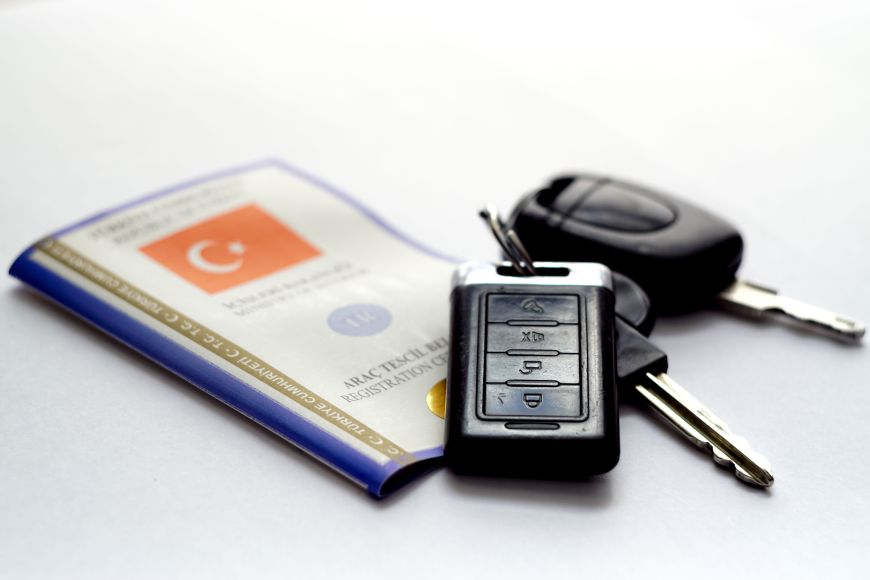
Foreigners who exceed the legal duration of a car's stay in Turkey are seriously at risk: the fine for the first month is relatively small, although it is constantly being reviewed upwards.
Meanwhile, those who do not take the car out of the country for more than two to three months are threatened with a fine of up to 25-30% of the car's market value.
Prices are taken from the Turkish market, which is 2-2.5 times higher than, for example, in Russia, Belarus, or Ukraine.
Remember, each time you cross the border in a car is counted: if you leave Turkey by car even for a few days, you will only be able to re-enter with it after 185 days.
You can track information about your entries and exits on the website.
Important: selling or renting out a car with foreign number plates in Turkey is practically impossible.
Firstly, the car owner must be re-arranged in the country of its registration or the consulate if it deals with these issues.
This means you can realistically transfer the car only to your compatriot, which raises many questions about the grounds on which he will continue to use this car in Turkey.
Documents, first aid kit, insurance — what you need to know
To import a car into the country, you must have the following documents: passport, driving license (internal format is acceptable if your country has signed the Vienna Convention), vehicle registration certificate, auto civil liability insurance policy, Green Card.
You can get such insurance in your home country at any major insurance company or where you got the primary policy — the insurer will expand its geographical coverage. The policy term should not be shorter than your stay in Turkey.
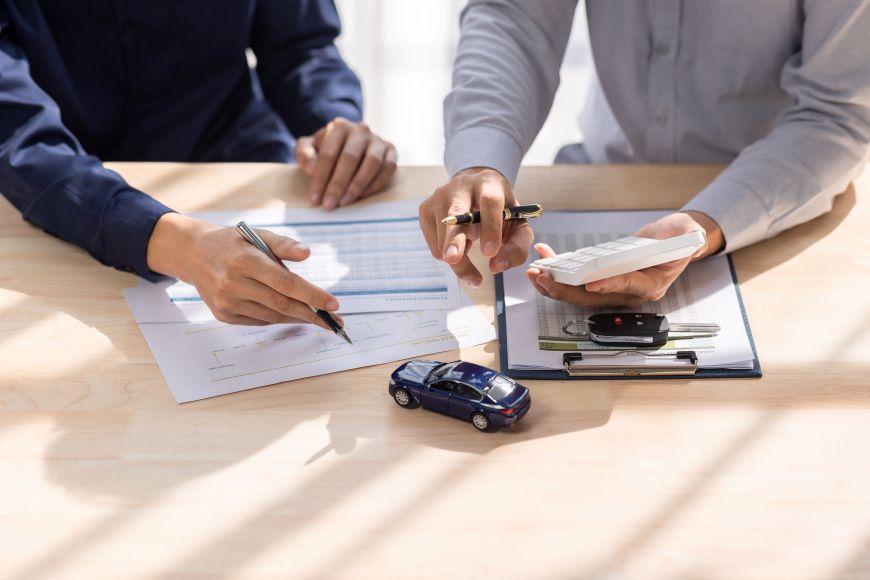
You can drive with a foreign licence for six months, after which you'll need to exchange it for a Turkish driving licence, or alternatively leave and re-enter the country (but not by driving).
If you plan to do a visa run to renew your license's validity period, make sure to notify customs about where your car will be while you're not in Turkey.
This could be a paid car park or another kind of parking lot, the primary thing is that authorities have this information. Otherwise, you could face a fine upon your return.
Another option for exchanging your licence is to surrender your foreign one in exchange for the Turkish one.
The hardest way is to obtain a licence from scratch, meaning studying at a local driving school and passing the exams (in some cities, for example, Antalya, this can even be done in Russian).
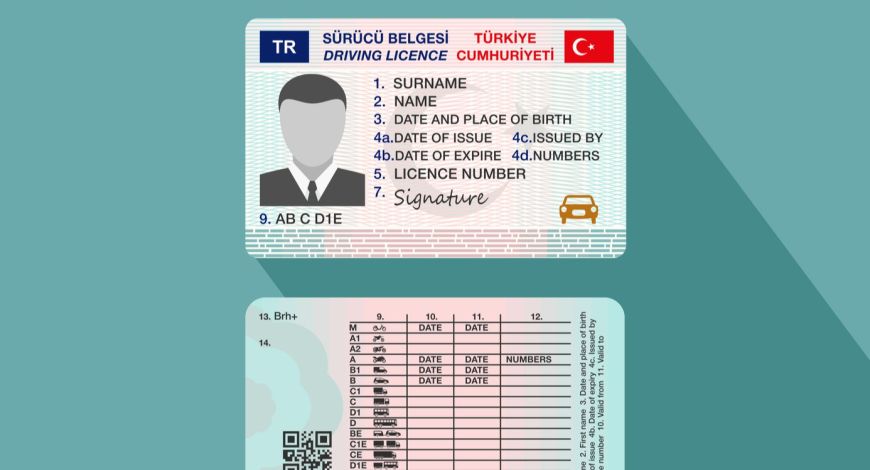
Just like in many other countries, driving in Turkey without insurance is prohibited and has penalties.
The equivalent of a third-party liability insurance policy here is called Zorunlu Trafik Sigortasi, and it can be bought as soon as you enter the country by car — if you don’t have a green card, this is a good option.
The minimum policy term is 3 months, and its price depends on your driving experience, the power of your car, and starts from 80 US dollars.
Besides the insurance policy and other documents, a first aid kit, fire extinguisher, and two emergency stop signs are mandatory within the vehicle.
Roads, Fines, Regulations, and Signs in Turkey: Features and Differences
The quality of the roads in the country is excellent, not just in the major cities — intercity highways and even roads leading to settlements detached from main roads are well paved, and even though inside these settlements roads are usually unpaved, they’re still of good quality.
Road markings are almost everywhere and are easily understood by foreigners.
There aren't as many toll roads in the country when comparing their length (just over 3,000 kilometres) to the total length — 426,000 kilometres.
There are several toll payment systems:
-
OGS stands for automatic payment using a transponder.
-
HGS is a payment system based on a sticker number (stuck on the windshield, can be bought at the post office or in a bank). There's no need to stop for payment, the system automatically reads the sticker number, checks the account balance, and deducts the payment.
If there’s not enough funds in the account, a red light comes on — you can continue driving, but make sure to top-up your account to clear the debt.
- Gates marked with NAKiT or K.KARTI allow on-site payment, either cash or by card.
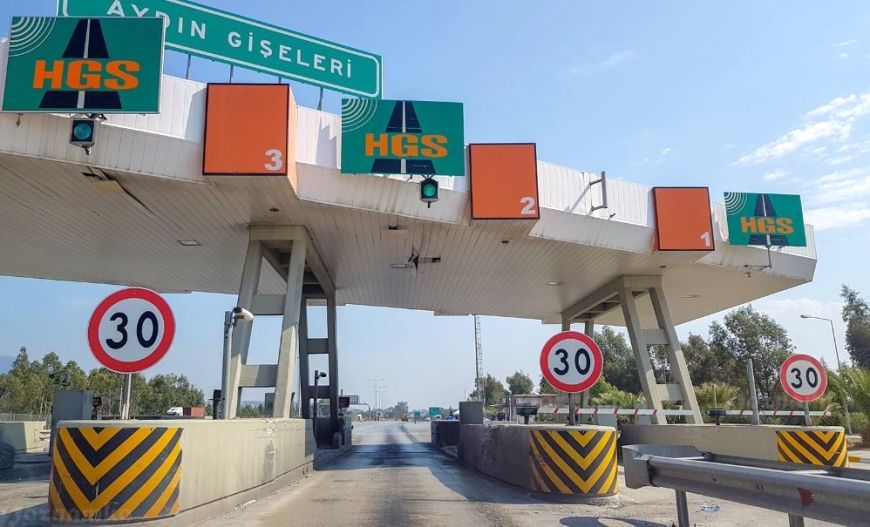
You can check if you have any unpaid bills for transit on toll roads here.
To start the search, enter the registration number of the vehicle.
Road signs in the country adhere to international standards and serve the same functions as elsewhere: providing directions, prohibiting passage or stopping, warning of hazards, or limiting driving speed.
A red sign with the inscription DUR means "stop" and prohibits movement without stopping.
On familiar signs warning of the possible occurrence of animals on the road, in Turkey, you can see turtles — large sea turtles inhabit some coastal areas and may sometimes cross roads.
Here are some key points to remember for driving on Turkish roads:
-
Large signs in the city reading YAVAŞ mean "slow down" — drivers are asked to lower their speed and be more aware of their surroundings. This is not an order but a recommendation, however, speed limits in populated areas are rather low anyway — up to 50 km/h.
On the roads between cities, speed limits are 90 km/h, on divided roads 110 km/h and on motorways up to 120 km/h.
-
There are cameras in the cities practically everywhere, as well as on the highways. And they perfectly capture foreign number plates, therefore fines will have to be paid — if not straight away, then certainly upon leaving the country.
You can check if there are any fines issued by cameras at the government portal. You can also make online payments there.
- Any fine can be paid with a 25% discount for early payment. If you plan on paying the fine later, remember you have 30 days to do this before you start accruing penalties.
Speaking of fines: they apply for speeding, not wearing seat belts, transporting children without a car seat, exceeding the permissible blood alcohol limit (0.5 promille), running a red traffic light, and other traffic violations.
Fine amounts vary from 30 to 500 euros, depending on the severity of the offence.
So, if you're caught driving under the influence for the first time, you would pay about 140 euros, and the second time you would lose your licence.
Interestingly, the country has a ban on drifting on public roads — unsafe driving is penalised with a fine of approximately 320 dollars.
Driving without insurance incurs a fine of about 1000 euros.
When stopped by a traffic officer, it's important to behave correctly. Firstly, don't panic — it won't help the situation.
You might not have violated anything, but just got caught up in a total car check. These operations are not uncommon in Turkey: one lane of traffic is closed, and then traffic police selectively stop cars to check documents.
Secondly, have your documents ready ( licence, insurance, vehicle registration certificate).
Thirdly, act friendly and appropriately — never try to bribe the officer, cooperate and don't attempt to mitigate your guilt by claiming foreign nationality.
The rules are the same for everyone, and if the police officer sees that you violated them accidentally (crossing markings, slightly exceeding the speed limit), they might let you go without a fine, just a warning.
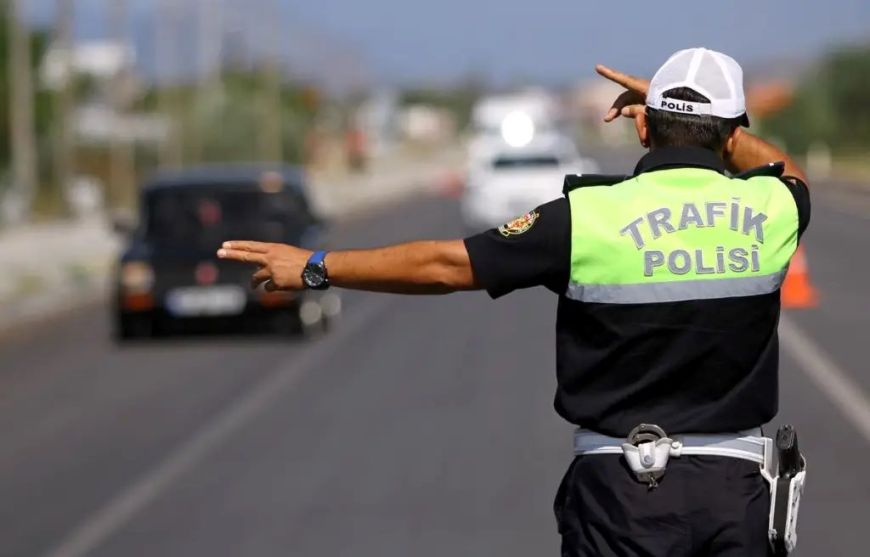
It's important: Despite good roads, omnipresent cameras, and frequent traffic police raids, Turkey remains among the countries with a relatively high rate of road accidents.
The reason for this is the lack of a driving culture. Actually, it exists, but it's quite unique.
Almost no one stops in front of zebra crossings here. If you do, there is a high likelihood that a vehicle from behind may collide with yours. Not every driver feels it necessary to use indicators either.
Minibuses stopping right in the middle of the road to drop off passengers, and pedestrians crossing the road randomly, are ordinary sights in Turkey.
Do not fear when a car honks from behind while waiting at a traffic light, even when it's on yellow - it is not considered as something unusual here, it's just a reminder that the movement must start immediately after the green signal comes on.
Refuelling, Parking, Car Washing and Servicing Stations in Turkey
There are plenty of petrol stations in Turkey, they are clearly visible from roads thanks to large signs, price boards and illumination.
Attendants are available everywhere, with the service procedure consistent with international standards: come up to the pump, park, switch off the engine and wait for the attendant - purely automatic refuelling and payments are still not very advanced in Turkey.
You can pay in cash or with a credit card. You can purchase water and snacks at any gasoline station, and even roadside stations often have cafes and small restaurants operating.
If you want to grab a bite or have a coffee, first move your car away from the pump. You can also top up your windshield washer tank and inflate your tyres for free.
Fuel quality in Turkey is pretty good but we recommend using the network petrol stations, where this is monitored better: Shell, BP, Opet or Aytemiz.
92-octane petrol is nowhere to be found; 95, 98, diesel or Euro diesel are available at every station. Petrol prices are high and constantly rising, but are still lower than in Europe.
The Turks have grown accustomed to this and now select petrol stations based on service level because the rates are more or less identical across the board. It's important to note that according to Turkish law, it is prohibited to carry more than 25 litres of fuel in cans in the vehicle.
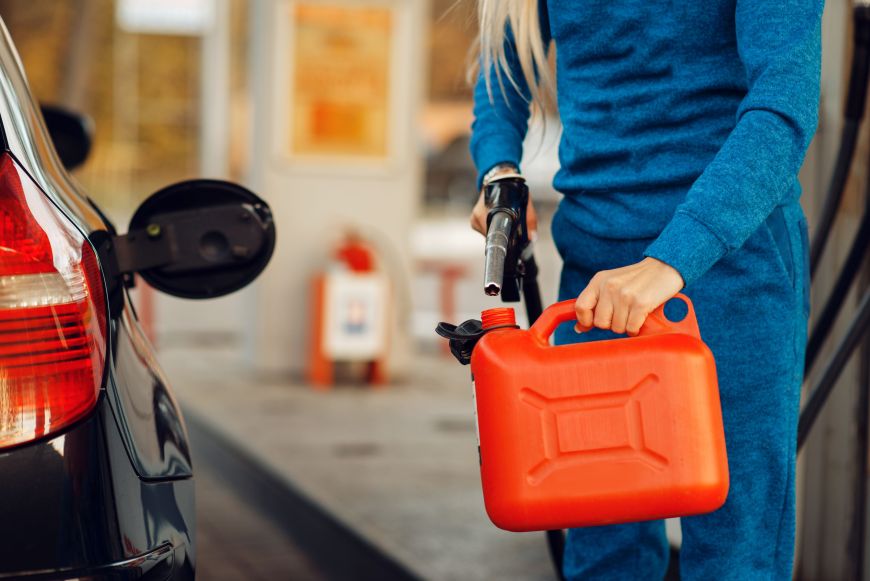
You can wash your car at a gasoline station but most likely, you will have to do it yourself: they will provide water, foam (the cost of a session is no more than 15 lira), but the water is only cold and the pressure isn't very high.
If you find a station with car wash services, keep in mind that the wash will be contact-based (they first wash off dirt with a pressure washer, then scrub it with a soapy mop, followed by another rinse using the pressure washer).
Additional services like cleaning the car interior or polishing surfaces inside come at an extra cost. At some stations, if you fill up the tank, they might clean your mirrors and windows.
Regarding parking, there usually aren't any problems in Turkey, but most parking spaces are paid.
You can leave your car on the right-hand side of the road, outside the 'No Parking' sign zone, ensuring you don't hinder the passage of other road users.
In larger cities, there are paid parking zones almost everywhere, where you leave your car, and upon returning, a parking attendant with a billing terminal awaits you. After payment, you will receive a cash receipt.
Such car parks are marked with an R sign and blue and yellow markings (note, the signs are small and can easily be overlooked if you are unfamiliar with them). If a car is parked in such a place for less than 15 minutes, there is no need to pay.
Near major shopping centres, museums, restaurants, and other public places, there are almost always paid private car parks.
They are convenient, secure, and payment is accepted on entry or exit. If you paid on entry, do not throw away the receipt, you will need to present it later, or you will be charged again.
Covered and underground car parks in large cities operate on a similar principle: upon entry, you receive a ticket indicating the time, and upon exit, you pay for the parking to a controller or at a machine.
After payment, you will be given a card that triggers the barrier. The cost of private parking starts from 1 dollar per hour.
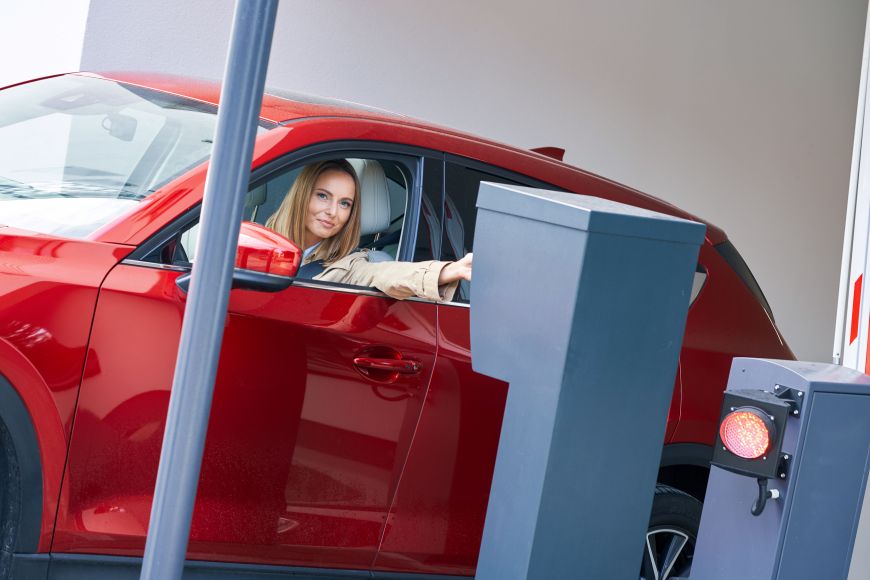
Important: parking in an unsuitable place in Turkey is a serious violation, especially if you stopped in a space reserved for disabled transport, left the car on hospital grounds or government premises.
Unpaid parking fines can be found in the same place as for other traffic violations (link above).
If you need to repair the car in Turkey or just carry out regular maintenance (change the oil, filters), look for a car service on the map - in Antalya, for example, there is a whole street of garages, this district is called sanayi where there are tyre shops and services that carry out car detailing.
In other cities too, such businesses are usually located nearby, which is quite convenient: you can compare prices on the spot and choose the most suitable one.
The cost of repair work and maintenance is on average twice as low as in other European countries, they can also choose affordable parts, from those contracted, not originals.
For example, replacing a wheel set with alignment will cost about 50 dollars, replacing a timing belt (with the cost of the belt and rollers included) - 100 dollars.
Of course, the cost of services largely depends on the car brand: repairing popular cars in Turkey like Fiat, Renault, or Opel will be cheaper than less common Chinese cars.
By the way, in many large cities, there are already car repair services or garages where employees speak English or Russian.
If you have decided to move to Turkey, we are always ready to assist you with this. Trust the professionals, trust the best in their field, choose Tolerance!
We will be happy to answer all your questions, get in touch via Whatsapp +90 (532) 158 42 44
If you want to permanently move to Turkey, write to our specialists who will select the best options for your budget.
Also, subscribe to our YouTube channel and Instagram page and get information directly from the professionals!
Additional communication channel with us: Telegram
Team Tolerance | 20 years with you

